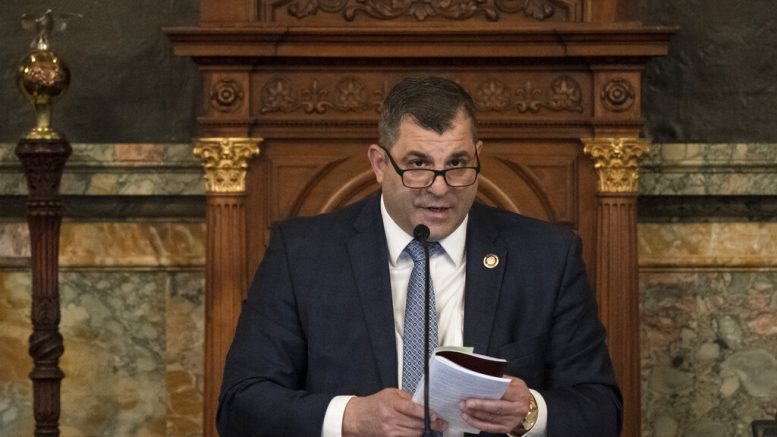HARRISBURG (AP) — Victims would be able to sue over otherwise outdated claims of child sexual abuse under two pieces of legislation passed Friday by the Pennsylvania House, but it’s unclear whether the state Senate will take them up.
The legislation to temporarily waive the statute of limitations for sex abuse crimes had been on the verge of going before voters for the final OK two years ago, when state officials bungled the required advertising of the previous version.
The House voted Friday 161-40 to send the Senate a constitutional amendment that, if senators go along with it, could go before voters for final approval as soon as November. Separately, they also voted 134-67 to make the change as regular legislation that would take effect immediately if passed by the Senate and signed by the governor.
It was a major accomplishment for House Speaker Mark Rozzi, a Berks County Democrat elected to preside over the chamber early last month after both Republicans and Democrats could not muster enough support for their first choices, and for Rep. Jim Gregory, a Republican from Blair. Both Rozzi and Gregory have fought for the lawsuit window, and both have talked publicly about being abused as children.
“I want to tell you that I am sorry and that I pray that you will have what you need to heal,” Gregory said in remarks aimed at victims before the constitutional amendment vote. “It should not have taken this long.”
Political momentum to provide a way for those victims to sue was generated largely by a series of revelations regarding sexual abuse of children in the state by Roman Catholic clergy, but the proposed two-year window would apply to all victims who have not been able to sue under the narrow time limits formerly allowed by state law.
Rep. Tim Bonner, a Republican from Mercer and a former prosecutor who handled child molestation cases, said making the legislation retroactive was the right thing to do. He predicted it will be upheld by the courts against legal challenges.
“Child molesters are like vampires: They just keep coming back to their victims time and time again,” Bonner said. “So many children, so much evil, so many nightmares.”
It’s unclear what will happen to the bills in the Senate, which voted Jan. 11 for the constitutional amendment in a bundle with two other Republican priorities: expanded voter ID requirements and a lower threshold to invalidate state regulations pushed through by a governor’s administration. The three constitutional amendments passed the Senate on a nearly party-line vote.
“It is time to bring closure to the conversation,” Senate Majority Leader Joe Pittman, a Republican from Indiana, said during that debate. He said that vote would “be the final time the Senate of Pennsylvania addresses this matter.”
Rozzi, who has said he was molested by a now-deceased parish priest, said concerns about Senate inaction should not stop the House from passing the proposals.
“If the Senate’s not going to take it up, we might as well stop half the business we do in the House,” Rozzi told his colleagues.
During the Friday debate, some Republicans expressed concern that one or both of the bills are vulnerable to legal challenges. Some focused on a procedural problem: Gregory was listed as a co-sponsor without his knowledge or consent. He stripped his sponsorship from the statute bill but not the constitutional amendment. Some were worried about the fairness and legality of changing the statute of limitations retroactively.
And there were predictions that lawsuits against public schools will prove costly to taxpayers.
“I want justice for the victims, but it’s got to fall on the people that committed these crimes,” said Rep. Eric Davanzo, a Republican from Westmoreland.
Rep. Matt Bradford, a Democrat from Montgomery, brushed off the concerns.
“We have a path to justice in front of us today. Delayed, yes, but justice today,” Bradford said. “The objections raised are meritless. The need for justice is real, it is upon us.”
Rep. Napoleon Nelson, another Democrat from Montgomery, said if the courts throw out the legislation, “then we’ll bring it back.”
“It is always the right time to do the right thing,” Nelson said.





































